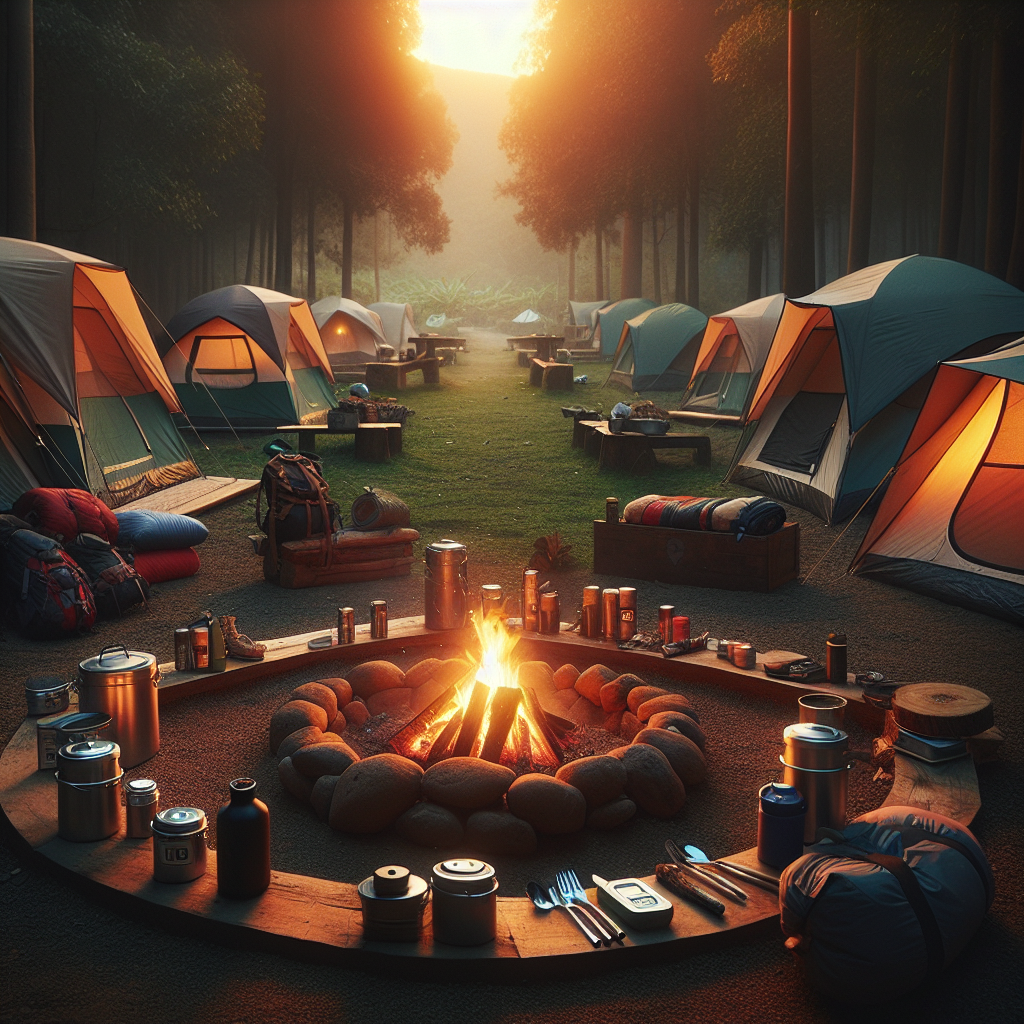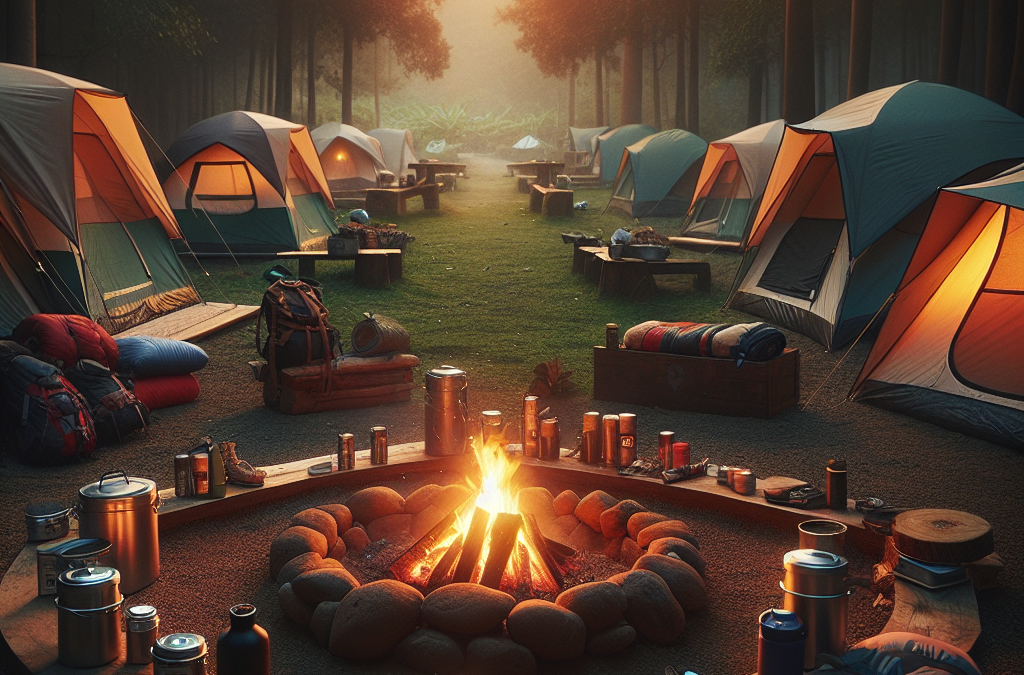“Campground Etiquette: Being a Considerate Camper” is all about fostering harmony and respect out in the great outdoors. You’ll discover pointers on how to adhere to the unspoken rules of camping, ensuring that you not only enjoy your camping experience but also become a great camping neighbour. From maintaining noise levels to respecting the natural environment, this piece serves to guide you on a journey to becoming a more considerate camper. So go ahead and grab your tent as we guide you through the essentials of camping etiquette.
Respect The Nature
As a camper, you play a crucial role in preserving the natural environment so that others can continue to enjoy it. Here are some pertinent ways you can respect nature during your outdoor trips.
Avoiding Disturbance to Wildlife
Wildlife is a beautiful part of the natural environment. However, it’s critical to remember that you’re visiting their home. Keep a respectable distance and avoid disturbing animals in their natural habitats. Remember, your behaviour can significantly affect an animal’s ability to find food, mate, or simply survive.
Proper Trash Disposal
How you dispose of your waste is a direct reflection of your respect for nature. Always take your trash with you when you leave. Discarding garbage irresponsibly can harm wildlife and deteriorate the natural beauty of the landscape. Recycle when possible and be mindful of using products with excessive packaging.
Care for Plant Life
Plants play an integral role in ecosystem health, providing essential nutrients, purifying the air and sustaining wildlife. Tread lightly, stay on designated paths, and refrain from damaging or picking any vegetation. This care extends to not carving names onto trees or tampering with plant life in any way.
Keeping Fires Contained and Controlled
Fire is a useful tool, but when mismanaged, it can wreak havoc on an ecosystem. Keep fires small and contained within designated fire rings or spots. Also, avoid making fires during periods of high fire risk.
Following ‘Leave No Trace’ Principles
“Leave No Trace” is a fundamental outdoor code that encourages respect for the environment, wildlife, and other people. This principle entails leaving the environment as you found it or better.
Maintain Quiet Times
Camping trips are often about seeking tranquillity and solitude, so maintaining quiet times is essential.
Understanding and Abiding by Campsite ‘Quiet Hours’
Most campgrounds establish ‘quiet hours’ to ensure everyone can enjoy their stay. Familiarize yourself with these hours as soon as you arrive and abide by them.
Avoiding Excessive Noise During Daytime
While the hustle and bustle of the day may feel lively, it’s still important to keep noise levels in check. This courtesy extends to your entire campsite including your voices, audio devices, and vehicles.
Limiting Noise from Audio Devices
Music and podcasts can enhance a camping trip, but remember sound travels. Keep the volume at a moderate level and consider using headphones, particularly if you’re in a crowded campground.

Consideration for Other Campers
Living in close quarters during a camping trip means considering other campers to maintain a peaceful environment.
Keeping Personal Items within Your Space
Your camping area should be contained to your assigned spot. Be mindful to keep your belongings within your space, including tents, vehicles, and equipment.
Respecting Boundaries of Other Campsites
Campers have an unspoken agreement of maintaining personal space. Respect the boundaries of other campsites; avoid walking through their sites and be mindful of your activities that may intrude on their privacy.
Control of Pets and Children
Pets and children can bring joy to camping trips but they need supervision. Ensure they are respectful and do not wander into other campsites uninvited.
Proper Use of Shared Facilities
Shared facilities are a part of many campgrounds and using them requires extra consideration.
Clean Up After Using Showers, Restrooms or Laundry
Practicing cleanliness when using shared facilities leaves them in a pleasant state for the next user. Clean up after yourself, taking any trash with you and leaving things looking better than you found them.
Being Mindful of Usage Time When Others Are Waiting
Time is precious, especially when facilities are shared. Be mindful of how long you’re using a facility when others are waiting, ensuring everyone gets a fair turn.
Turn Off Lights and Close Doors
Show respect for shared facilities by saving energy. Turn off lights when you leave and ensure doors are closed properly. This simple act can make a big difference.

Safe and Mindful Campfire Practices
Having a campfire can be one of the most enjoyable parts of camping if done safely.
Keeping Fires Within Designated Fire Rings
Designated fire rings are there for safety and to minimize impact on the surroundings. Always use them and avoid creating new fire sites.
Never Leaving Fire Unattended
Leaving a fire unattended can have disastrous results. Fires should be fully extinguished before leaving the site for any reason.
Proper Extinguishing of Campfires
Quenching a fire correctly is as important as starting one safely. Douse the fire with water, stir the ashes and douse again to ensure it’s completely out.
Visible Etiquette
The way your campsite looks can impact the experience of fellow campers and wildlife.
Avoiding Intrusive Lighting
Light can help navigate the darkness, but excessive lighting can disturb other campers and wildlife. Use energy-saving modes and only as much lighting as necessary.
Keeping Your Campsite Tidy
A tidy campsite is not only safer but is a visual demonstration of respect for others and the environment. Stow your gear neatly and pick up trash regularly.
Storing Away Camping Equipment that May Cause Accidents
Left out equipment can quickly become a tripping hazard. Store away everything properly when not in use, especially at night.
Avoid Feeding or Attracting Wildlife
Interacting with wildlife inappropriately can have unintended consequences.
Importance of Not Feeding the Animals
Feeding wildlife can lead to dependency on humans and disease transmission. It’s better to observe animals from a distance.
Keeping Food Stored Away and Secured
Food and food-smelling items should be kept secure. They can attract animals and disrupt the natural balance of the ecosystem.
Understanding and Responding to Wildlife Encounters
Your response in a wildlife encounter can greatly influence the outcome. Research common fauna in your camping area and appropriate responses to encounters.
Road Etiquette Within Campgrounds
Campsites often have internal roads and paths that require observance of certain rules.
Abiding by Posted Speed Limits
Speed limits are set to ensure safety within the campground. Abide by all posted limits and signs.
Mindfulness of Children and Pets
Children and pets often roam around more freely in a campground than in other surroundings. Slow down and stay alert.
Respect of Other Campers’ Space While Driving
Staying within marked roadways and parking areas helps protect the peace and privacy of other campers.
Plan Ahead and Be Prepared
A well-planned camping trip can be more enjoyable and reduces potential impact on the environment.
Researching Campground Rules and Regulations
Each campground has its own specific rules and regulations. Plan ahead by researching and understanding them to avoid any surprises or transgressions.
Ensuring Adequate Supplies for Your Stay
Running low on essential supplies can push you to overstep boundaries. Pack adequately for your stay, from food and water to first aid supplies.
Understanding and Preparing for Weather and Geological Conditions
Weather and geological conditions can drastically affect your camping trip. Be prepared by researching the local climate and terrain and pack accordingly.
Leaving the Campsite Better Than You Found It
The goal of each camping trip should be to leave the area better than you found it.
Proper Cleanup of Campsite Before Departure
Perform a thorough cleanup before your departure, ensuring no trash or belongings are left behind.
Reporting Any Damage or Issues to Campground Officials
If you find any damage or issues during your stay, let the campground officials know. This helps them maintain the area for future visitors.
Restoring the Area for the Next Camper
Ultimately, your goal should be to make the campsite welcoming for the next camper. Restore the area to its original state or better, preserving the beauty and integrity of the natural environment for others.

